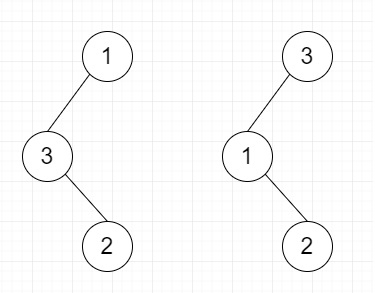
 Data Structure
Data Structure Networking
Networking RDBMS
RDBMS Operating System
Operating System Java
Java MS Excel
MS Excel iOS
iOS HTML
HTML CSS
CSS Android
Android Python
Python C Programming
C Programming C++
C++ C#
C# MongoDB
MongoDB MySQL
MySQL Javascript
Javascript PHP
PHP
- Selected Reading
- UPSC IAS Exams Notes
- Developer's Best Practices
- Questions and Answers
- Effective Resume Writing
- HR Interview Questions
- Computer Glossary
- Who is Who
Recover Binary Search Tree in C++
Suppose we have one binary search tree, now consider two elements of this BST is swapped, so we have to recover this binary search tree.
So if the given tree is like below (first one), the recovered tree will be (second one) −

To solve this, we will follow these steps −
Define some prev, first, second reference for nodes
Define one method called findProblem(), this will take node
if node is null, then return
call findProblem(left of node)
-
if prev is not null and value of prev > value of node, then
if first is null, then first = prev
second := node
prev := node
call findProblem(right of node)
From the main method do the following −
initialize prev, first and second as null, call findProblem(root) and swap values of first and second nodes
Example (C++)
Let us see the following implementation to get a better understanding −
#include <bits/stdc++.h>
using namespace std;
class TreeNode{
public:
int val;
TreeNode *left, *right;
TreeNode(int data){
val = data;
left = NULL;
right = NULL;
}
};
void insert(TreeNode **root, int val){
queue<TreeNode*> q;
q.push(*root);
while(q.size()){
TreeNode *temp = q.front();
q.pop();
if(!temp->left){
if(val != NULL)
temp->left = new TreeNode(val);
else
temp->left = new TreeNode(0);
return;
} else {
q.push(temp->left);
}
if(!temp->right){
if(val != NULL)
temp->right = new TreeNode(val);
else
temp->right = new TreeNode(0);
return;
} else {
q.push(temp->right);
}
}
}
TreeNode *make_tree(vector<int> v){
TreeNode *root = new TreeNode(v[0]);
for(int i = 1; i<v.size(); i++){
insert(&root, v[i]);
}
return root;
}
void tree_level_trav(TreeNode*root){
if (root == NULL) return;
cout << "[";
queue q;
TreeNode *curr;
q.push(root);
q.push(NULL);
while (q.size() > 1) {
curr = q.front();
q.pop();
if (curr == NULL){
q.push(NULL);
} else {
if(curr->left)
q.push(curr->left);
if(curr->right)
q.push(curr->right);
if(curr == NULL || curr->val == 0){
cout << "null" << ", ";
}else{
cout << curr->val << ", ";
}
}
}
cout << "]"<<endl;
}
class Solution {
public:
TreeNode* prev;
TreeNode* first;
TreeNode* second;
void swapValue(TreeNode* first, TreeNode* second){
int x = first->val;
first->val = second -> val;
second->val = x;
}
void findProblem(TreeNode* node){
if(!node || node->val == 0)return;
findProblem(node->left);
if((prev!=NULL && prev->val != 0) && prev->val> node->val){
if(!first){
first = prev;
}
second = node;
}
prev = node;
findProblem(node->right);
}
void recoverTree(TreeNode* root) {
prev = first = second = NULL;
findProblem(root);
swapValue(first, second);
}
};
main(){
vector<int> v = {1,3,NULL,NULL,2};
TreeNode *root = make_tree(v);
Solution ob;
ob.recoverTree(root);
tree_level_trav(root);
}
Input
{1,3,NULL,NULL,2}
Output
[3, 1, null, null, 2, ]

